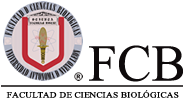
 COMPETENCE STUDY PLAN OF THE EDUCATIVE PROGRAM OF CHEMICAL BACTERIOLOGY AND PARASITOLOGY 401
COMPETENCE STUDY PLAN OF THE EDUCATIVE PROGRAM OF CHEMICAL BACTERIOLOGY AND PARASITOLOGY 401
A Chemical Bacteriology and Parasitology gradute applies the scientific method to contribute to the investigation and diagnosis of metabolic and infectious diseases; as well as to assure the microbiological quality of finished products and their raw materials and to evaluate the biotechnological potential of microorganisms and enzymes applying chemical-clinical, microbiological and parasitological knowledge
|
Discipline |
Modules |
Competence |
|
Clinical Chemistry |
Inorganic chemistry, Laboratory management, Organic chemistry, Physic chemistry, Biochemistry, Biochemistry II, Analytic chemistry, Instrumental analysis, Quality management, Metrology and validation, Cellular biology, Genetics, Histology and hematology, Immunology, Anatomy and physiology of chordates, Virology, Clinical virology, Molecular diagnosis of microbial diseases, Pathology and epidemiology of microbial diseases, Medical microbiology. |
To contribute with the diagnosis of metabolic, microbial and autoimmune diseases that affect human health. |
|
Microbiology |
Ecology and biodiversity, Basic methods on microbiology, Mycology, Microbial physiology, Hygiene and sanitation, Molecular biology, Sanitary microbiology, Environmental microbiology, Industrial biotechnology, Topics in molecular biotechnology, Environmental biotechnology, Plant biotechnology, Agricultural biotechnology, Topics in microbiological diagnosis, Predictive microbiology. |
To evaluate the microbial diversity assuring the quality of products and raw materials and to evaluate its biotechnological potential in the generation of products, transformation of residues and restoration of ecosystems. |
|
Parasitology |
General parasitology, Protozoology, Helminthology, Topics in clinical parasitology, Phytopathology. |
To contribute with the diagnosis of parasitic diseases that affect the health of living beings. |

